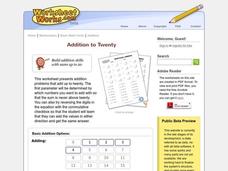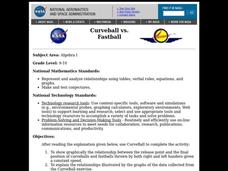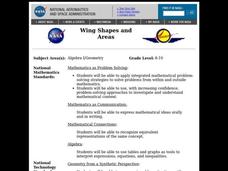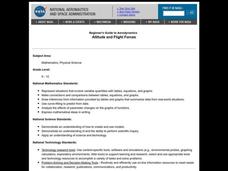Curated OER
High Exposure
Students interpret data they receive from the media, discuss possible misinterpretation of data from the media and correctly respond to the misconception quiz question.
Curated OER
Dating Practices
Students interpolate, extrapolate, and make predictions from given information. They present results and conclusions from given data using basic statistics. Pupils create a survey from a critical question and decide which sampling...
Curated OER
From 5 To 50, By Fives
In this from five to fifty by fives instructional activity, students practice completing a multiplication table with only multiples of five for its inputs.
Curated OER
Addition to Twenty
In this addition tool for creating a worksheet, learners problem solve and calculate the answers to twenty addition equations. Students show each step of their work.
Curated OER
When Things Heat Up
Ninth graders investigate relationship between the temperature and concentration of dissolved oxygen in water. They examine how pollution and other natural influences can cause the parameters to change. In groups, 9th graders collect...
Curated OER
Technology: Programming Graphics
Students use the DrScheme program to create graphics for clip art. Using graphics, they plan their designs using basic shapes, plotting its positions, and studying the relationships between points. By plotting the necessary data on...
Curated OER
Follow That Graph
Students investigate the graphs of six trigonometric functions. They discover how changes in the equation of the basic function affect the graph of the function.
Curated OER
What's up with the weather?
Students use the weather as a context for collecting data and making interpretations based upon the observations. The scientific method is also taught to give them a way to conduct the data collection.
Curated OER
Refining and Reasoning Behind Scale Drawings
Students discuss accuracy and the need for it in blueprints in order to create the final project. They further refine and perfect drawings as part of the school drawing project. Students create a blueprint for the new school building...
Curated OER
"Ball Bounce" Quadratic Functions
Young scholars manipulate a ball and explore quadratic functions. In this algebra instructional activity, students analyze the graph of a quadratic function. They identify quadratic properties.
Curated OER
Paper Packaging Design
Young scholars discuss the relationship between technology and manufacturing. They then use their ideas to construct a model of a paper board carton package. Next they view a PowerPoint presentation to learn about the history of...
Curated OER
Curveball vs. Fastball
Students graph the relationship between the release point and the final position of curveballs and fastballs thrown by both right and left handers given a constant speed, and explain the relationships illustrated by the graphs of data.
Curated OER
Lift vs. Airspeed
Young scholars, after reading the explanation given below, use FoilSim and a graphing calculator to complete the activity to determine the relationship between airspeed and lift of an object by interpreting data.
Curated OER
Wind Gauges
Young scholars use FoilSim interactive software to become familiar with the way in which the flow of air across or around an airfoil affects its ability to create lift.
Curated OER
Wing Shapes and Areas
Students, after reading the explanation given below, use FoilSim to determine the weight of the aircraft that can be lifted by a pair of wings of each type. They also design a unique platform of a wing to lift a plane weighing 11500 pounds.
Curated OER
Altitude and Flight Forces
Students use the World Wide Web to access and use FoilSim. They also use the World Wide Web to access the NASA Glenn Web site for information relative to the factors involved with the flight of an airplane.
Curated OER
Characteristics of Lift and Wing Area
Students use FoilSim to complete the activity and investigate the factors that affect lift and how wing area and lift are related.
Curated OER
Using 3-D Models for Code Validation with FoilSim
Students use FoilSim to complete the activity to create tables of data sets comparing the lift values for a 3-D model of a symmetrical wing section to the values predicted by the FoilSim software.
Curated OER
Lift Equation Problem Set
Pupils, after reading an explanation from a NASA Web-based textbook, demonstrate an understanding of the text by using it, along with FoilSim, to complete an activity to graph and interpret the lift equation.
Curated OER
Wing Area Effects Problem Set
High schoolers read an explanation from a NASA Web-based textbook on lift and an explanation on the FoilSim software package given below. They use FoilSim to evaluate the relationship between wing area and lift.
Curated OER
Velocity Effects Problem Set
Students, after reading an explanation on lift from a NASA Web-based textbook and an explanation on the FoilSim software package given below, use FoilSim to evaluate the relationship between velocity and lift.
Curated OER
Central Tendencies and Normal Distribution Curve
Fourth graders are given data (class test scores) to determine central tendencies, and find information needed to construct a normal distribution curve. They become proficient in calculating mode, median and average.
Curated OER
Pyrotechnics
Students discuss pyrotechnics and what they have noticed about their height and speed. They think about the path which fireworks follow which is a parabola. They follow multiplication patterns to determine the Zero Product Property and...

























